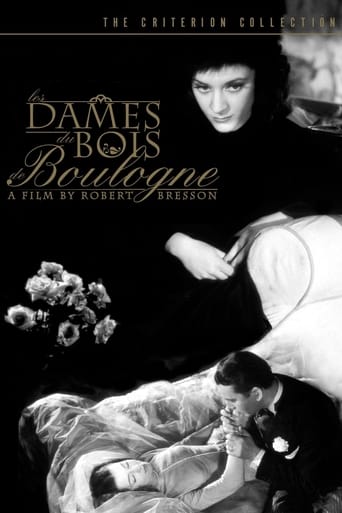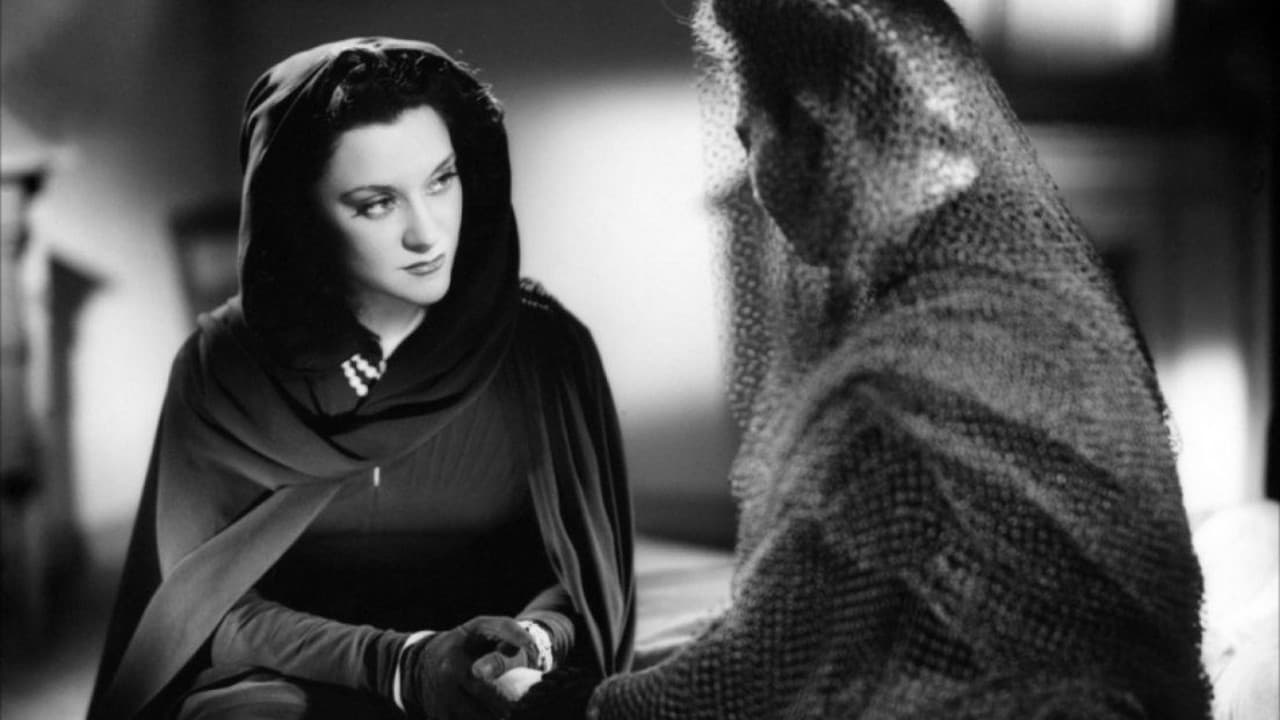jackasstrange
A minor film in Bresson's filmography, still surprisingly good though. There is really a lot of craft put in the film, the shaping of the lights and shadows, if you pay attention, various objects are put purposefully next to the characters to represent their current emotional state (the flowers, ivory jars etc.) . Is a story mainly about revenge, but also deals with subjects such as oppressive exterior forces vs the individuals will, manipulation, and a very obvious critic to the socialites and their behavior. Interesting I'd say, though it kinda drag at times. Oh, and I liked very much Maria Casares acting too. By far the best of the entire cast. This is also the last Bresson's film to feature a cast entirely composed of professional actors. A 7.5 is a fair rating.
CitizenCaine
French auteur director Robert Bresson co-wrote and directed Les Dames Du Bois Du Boulogne during the close of World War II. The film illustrates the classic love triangle of a woman scorned plotting revenge, a man bored with his lover who almost immediately turns his attentions toward another young prospect, and a young girl from the wrong side of the tracks trying to improve her station in life, keenly aware of needing to support her mother. However, as with most of Bresson's films, the film is deceptively simple in its construction but not in its execution.The beautiful and enigmatic Maria Casares stars as Helene, the woman irked by her lover's easy acceptance of her rejection. Every woman wants to attain the upper-hand over her jilted lover it seems. Casares is absolutely mesmerizing as the conniving upper-crust woman consumed by anger and revenge. Paul Bernard plays the seemingly naive Jean who turns his attention from one woman to another and winds up faced with the classic dilemma facing many men: madonna vs. whore. Bernard has the right combination of charm, naivete, and romance to carry the role. Elina Labourdette has, perhaps, the most difficult role of Agnes, the seemingly innocent girl with a past torn between her duty to her mother, her guilt and shame, and her ambivalence toward men in general.Amazingly, Casares and Bernard seem very contemporary in their roles, despite the age of the film, demonstrating that Bresson had a keen eye for the psychosocial detail of his characters. However, there seems to be an element of unbelievability, as some viewers put it, in the characters and/or the story itself. This doubt stems from the romanticized traits of Jean and perhaps Agnes as well. Jean wants to believe that Agnes is his ideal wife until Helene dashes his hopes, at least temporarily. Agnes is grief-stricken with guilt over the revelations about her past that Jean discovered too late via Helene. In a wonderful bit of idealistic romanticism, Bresson's camera lifts itself above the couple at the key moment when viewers are waiting for the definitive answer regarding the couple's survival; at this moment, the camera's view illustrates that instant in every life when we're faced with the moment of truth. In the end, the characters stay true to themselves despite their obvious shortcomings, and isn't that what real love's supposed to be about? Jean Cocteau contributed to the screenplay, and the cinematography highlights the contrasts between light and dark, mirroring the attributes of its characters. There are no signs of Vichy France during the film despite its World War II time period, and one wonders whether the minimalist Bresson's style happens to be synonymous with having the foresight to convey this universal story outside the confines of time. Perhaps that's too idealistic of an outlook to espouse. It's the working definition of a what would become to be known as a "chick" flick, but it also has an ethereal quality that elevates it above its type. It's based on an episode from philosopher Denis Diderot's 1796 novel Jacques Le Fataliste. *** of 4 stars.
MisterWhiplash
In Les Dames du Bois de Boulogne (or The Ladies of the Bois de Boulogne), we see a society woman Helene played with icy and curiously subtle perfection by María Casares (notice the colorful hats and little white dog and servant) get her form of revenge on an ex-lover (or would-be lover) by having him fall for another woman, a sort of wonderful dancer but more "street" type named Agnes (also very wonderful Elina Labourdette). He doesn't know about her past, since she and her guardian of sorts Mme. D have moved out of their previous dingy place of living, and she can't stand him falling for her since, frankly, she starts to fall in love with him too. What to do? Marriage of course, with some results that on the surface look right out of a TV soap opera.Which, perhaps, is part of the point. A Hollywood director could make a tawdry melodrama out of the ingredients present here, but the director Robert Bresson is interested in other things, what makes the passions of these characters tic themselves. We see letters written (sometimes with the "help" of another in a conniving way), glances turn into loving stares, significant little things like the lending of an umbrella or the presence of new flowers, the drop of a glass during dinner from minor shock or dismay. At the same time Bresson doesn't let us think these people shouldn't be together, making the eventual dastardly twist make it even harder but even more necessary for Agnes and Jean to be together. Or to try.Some may be thrown off slightly, as I was, by Bresson's direction here having seen his later, more famous works like his masterpiece A Man Escaped and near-great films (or arguably just the best there is) like Au hasard Balthazar and Pickpocket and how much more restrained and 'stone-cold' emotionally one might say compared to this film. If he hadn't gone his own way with Diary of a Country Priest, Bresson could have gone the way of a more conventional career on the basis of this project, which features some more conventional touches like in the editing, or in allowing for certain moments of incredible and even sensual joy like when Agnes dances. But it's the small touches, and certain traits in the performances that he's able to bring out of his actors, that do mark it as a Robert Bresson picture. And if anything having such a tug-of-war of what is love, what is it to fall for someone dearly in the face of a trick or whatever or cynicism benefits from having somewhat more conventional emotional scenes than the drained sorrow of Balthazar.Not to mention having Jean Cocteau writing the dialog, which is such an added bonus that it must not be dismissed. Here we see Cocteau's mark by way of the dialog being very rich in getting to the heart of the matter in almost every scene but seamlessly still adhering to Bresson's scenario. One might say it's very "French" in the romantic sense, but why carp? It is a film with three big French names in the writing credits (Diderot, a famous novelist also responsible for The Nun, has a credit as well), and as far as French romance films of the period go it's so deeply affecting that I would say it's mandatory for someone following films of the 1940s from the country. It's about what may or may not be futile in the ways of the heart, or in the worse ways of the heart, and what surpasses society by two people just connecting with each other. A+
christopher-underwood
There is much to enjoy in this simple tale of the wrath of a woman scorned, but 'timeless', 'masterpiece' or 'spellbinding', I rather think not. It is beautifully shot with memorable performances and an effective if barely believable dialogue. Early on the power and determination evidenced by a mere look from Maria Casares does give one hope that this might have the power of a vintage Bunuel. Unfortunately, for me, Bresson is far more interested in humiliation and misogyny than real passion and convincing evil. I know allowances have to be made for the passing time and changes morals but surely even within the movie as it stands little really adds up. Something of infatuation is illustrated but where is the wonderful portrayal of deep love that some strange folk detect?


 AD
AD
